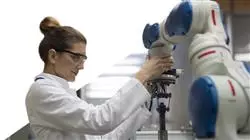University certificate
The world's largest faculty of information technology”
Introduction to the Program
Industry 4.0 is waiting for you. Enroll now and develop your robot by mastering the latest tools used in the sector"

Industry 4.0 is currently experiencing its best moment, so Robotics and the field of artificial vision have opened very attractive professional fields for the future of those professionals in these sectors, including computer scientists.
This Postgraduate diploma is aimed at graduates who wish to specialize in the field of Robot Navigation Systems for which the expert teaching team has prepared a syllabus that provides students with all the knowledge in this area so that upon completing this 6-month diploma course they will be able to master the main techniques and tools currently used in the development of Robotics.
Thus, this online program delves into the vision techniques used in Robotics, the development and understanding of algorithms, the improvement of the technique of image processing and analysis, as well as visual SLAM, Robot localization and Simultaneous Mapping using the latest techniques of Artificial Vision used.
The IT professional who wishes to progress in this field has an excellent opportunity to achieve their goals in a comfortable and flexible way, since this program allows access without fixed schedules to the entire content of the syllabus In this way, you can distribute the teaching load of the modules of this this syllabus, according to your needs. This allows you to combine your personal responsibilities with quality learning.
Organizing shelves in a warehouse, parking an autonomous car or delivering a package by steering a drone in an unfamiliar environment, all this can be achieved with Slam Visual and this Postgraduate diploma. Click and sign up"
This Postgraduate diploma in Robot Navigation Systems contains the most complete and up-to-date program on the market. The most important features include:
- Development of case studies presented by experts in robotic engineering
- The graphic, schematic, and practical contents with which they are created, provide scientific and practical information on the disciplines that are essential for professional practice
- Practical exercises where self-assessment can be used to improve learning
- Its special emphasis on innovative methodologies
- Theoretical lessons, questions to the expert, debate forums on controversial topics, and individual reflection assignments
- Content that is accessible from any fixed or portable device with an Internet connection
You are one step away from obtaining a Postgraduate diploma that will make you grow. Access to all the knowledge in Robotics with professionals of the sector"
The program’s teaching staff includes professionals from the sector who contribute their work experience to this educational program, as well as renowned specialists from leading societies and prestigious universities.
Its multimedia content, developed with the latest educational technology, will allow the professional a situated and contextual learning, that is, a simulated environment that will provide an immersive education programmed to prepare in real situations.
This program is designed around Problem-Based Learning, whereby the professionals must try to solve the different professional practice situations that arise throughout the program. This will be done with the help of an innovative system of interactive videos made by renowned experts.
Enroll now and don't miss the opportunity to be able to create alternative trajectories for Mobile Robots"

Master 3D Vision systems and launch your next project with this Postgraduate diploma"
Why study at TECH?
TECH is the world’s largest online university. With an impressive catalog of more than 14,000 university programs available in 11 languages, it is positioned as a leader in employability, with a 99% job placement rate. In addition, it relies on an enormous faculty of more than 6,000 professors of the highest international renown.

Study at the world's largest online university and guarantee your professional success. The future starts at TECH”
The world’s best online university according to FORBES
The prestigious Forbes magazine, specialized in business and finance, has highlighted TECH as “the world's best online university” This is what they have recently stated in an article in their digital edition in which they echo the success story of this institution, “thanks to the academic offer it provides, the selection of its teaching staff, and an innovative learning method aimed at educating the professionals of the future”
A revolutionary study method, a cutting-edge faculty and a practical focus: the key to TECH's success.
The most complete study plans on the university scene
TECH offers the most complete study plans on the university scene, with syllabuses that cover fundamental concepts and, at the same time, the main scientific advances in their specific scientific areas. In addition, these programs are continuously being updated to guarantee students the academic vanguard and the most in-demand professional skills. In this way, the university's qualifications provide its graduates with a significant advantage to propel their careers to success.
TECH offers the most comprehensive and intensive study plans on the current university scene.
A world-class teaching staff
TECH's teaching staff is made up of more than 6,000 professors with the highest international recognition. Professors, researchers and top executives of multinational companies, including Isaiah Covington, performance coach of the Boston Celtics; Magda Romanska, principal investigator at Harvard MetaLAB; Ignacio Wistumba, chairman of the department of translational molecular pathology at MD Anderson Cancer Center; and D.W. Pine, creative director of TIME magazine, among others.
Internationally renowned experts, specialized in different branches of Health, Technology, Communication and Business, form part of the TECH faculty.
A unique learning method
TECH is the first university to use Relearning in all its programs. It is the best online learning methodology, accredited with international teaching quality certifications, provided by prestigious educational agencies. In addition, this disruptive educational model is complemented with the “Case Method”, thereby setting up a unique online teaching strategy. Innovative teaching resources are also implemented, including detailed videos, infographics and interactive summaries.
TECH combines Relearning and the Case Method in all its university programs to guarantee excellent theoretical and practical learning, studying whenever and wherever you want.
The world's largest online university
TECH is the world’s largest online university. We are the largest educational institution, with the best and widest online educational catalog, one hundred percent online and covering the vast majority of areas of knowledge. We offer a large selection of our own degrees and accredited online undergraduate and postgraduate degrees. In total, more than 14,000 university degrees, in eleven different languages, make us the largest educational largest in the world.
TECH has the world's most extensive catalog of academic and official programs, available in more than 11 languages.
Google Premier Partner
The American technology giant has awarded TECH the Google Google Premier Partner badge. This award, which is only available to 3% of the world's companies, highlights the efficient, flexible and tailored experience that this university provides to students. The recognition as a Google Premier Partner not only accredits the maximum rigor, performance and investment in TECH's digital infrastructures, but also places this university as one of the world's leading technology companies.
Google has positioned TECH in the top 3% of the world's most important technology companies by awarding it its Google Premier Partner badge.
The official online university of the NBA
TECH is the official online university of the NBA. Thanks to our agreement with the biggest league in basketball, we offer our students exclusive university programs, as well as a wide variety of educational resources focused on the business of the league and other areas of the sports industry. Each program is made up of a uniquely designed syllabus and features exceptional guest hosts: professionals with a distinguished sports background who will offer their expertise on the most relevant topics.
TECH has been selected by the NBA, the world's top basketball league, as its official online university.
The top-rated university by its students
Students have positioned TECH as the world's top-rated university on the main review websites, with a highest rating of 4.9 out of 5, obtained from more than 1,000 reviews. These results consolidate TECH as the benchmark university institution at an international level, reflecting the excellence and positive impact of its educational model.” reflecting the excellence and positive impact of its educational model.”
TECH is the world’s top-rated university by its students.
Leaders in employability
TECH has managed to become the leading university in employability. 99% of its students obtain jobs in the academic field they have studied, within one year of completing any of the university's programs. A similar number achieve immediate career enhancement. All this thanks to a study methodology that bases its effectiveness on the acquisition of practical skills, which are absolutely necessary for professional development.
99% of TECH graduates find a job within a year of completing their studies.
Postgraduate Diploma in Robot Navigation Systems
If you are passionate about robotics and want to specialize in navigation systems, the Postgraduate Diploma in Robot Navigation Systems at TECH Global University is the perfect option for you. Taught by our renowned Faculty of Computer Science, this virtual postgraduate degree gives you the opportunity to acquire specialized knowledge in robot navigation systems and advance your career in the field of technology. Robot navigation systems are fundamental in the development of autonomous robots that can move and operate in complex and changing environments. According to data from the International Federation of Robotics, the global robotics and automation market is expected to reach $210 billion in the next few years. Therefore, having a specialization in robotic navigation systems gives you a competitive edge in this growing job market.
Specialize in robotic navigation systems.
This graduate degree is delivered entirely online, giving you the flexibility to study at your own pace from anywhere in the world. The curriculum, designed by robotics experts, covers topics such as environmental perception, motion planning, simultaneous localization and mapping, and autonomous robot navigation. One of the main advantages of online study is the ability to access the online study materials at any time, allowing you to adapt your study schedule to your personal and professional commitments. In addition, you will be guided by highly qualified professors during your learning process. The Postgraduate Diploma in Robot Navigation Systems at TECH Global University is a unique opportunity to improve your skills in the field of robotics and expand your career opportunities. Don't miss this opportunity to study online with a prestigious institution like TECH and gain specialized knowledge. Enroll today and advance your career in the exciting world of robotics!
See more information about the TECH Robotics Expert program here.







